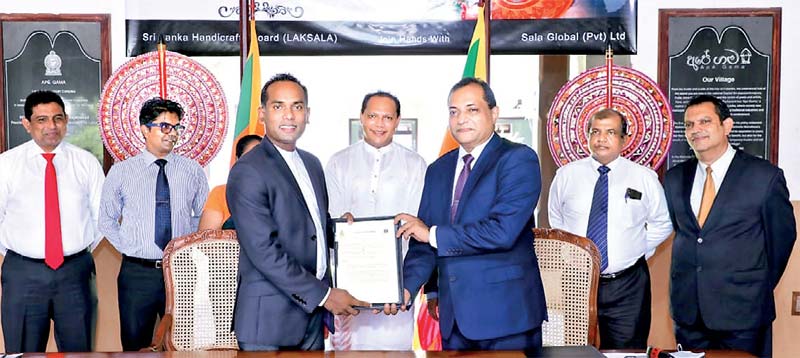Monday Feb 23, 2026
Monday Feb 23, 2026
Monday, 8 November 2021 02:36 - - {{hitsCtrl.values.hits}}

Sala Group Chairman/MD Chinthaka Wijewickram signing the partnership agreement with Laksala Chairman Lakmal Wickramaarachchi while State Minister Dayasiri Jayasekara looks on
|
Sri Lankan Ambassador in China Palitha Kohona on Zoom
|
Sri Lanka Handicraft Board, popularly known as “Laksala”, has partnered with Sala Global to take products of Sri Lankan artisans overseas.
The signing of the partnership was done physically and using Zoom (Hybrid). It was attended by State Minister of Batik, Handloom and Local Apparel Products Dayasiri Jayasekara, Sri Lankan Ambassador in China Palitha Kohona, Secretary Janaka Darmakeerthi, Laksala Chairman Lakmal Wickramaarachchi, Sala Group Chairman Chinthaka Wijewickrama, and Jason Wong from Alia Sleep Technology (Guangdong) Co. Ltd. China.
Laksala has 12 branches islandwide of which four are located in Colombo, and the balance in prominent main towns outstation. The ranges of items have exceeded 50,000.
Sala Group has 30 years of experience in the IT field having a large dealer network covering the entire country. They are the leaders in information technology and have been introducing innovative products to the Sri Lankan consumers.
Having seen the destitute situation of the artisans and the craftsmen in the country due to the present pandemic, SALA Global Ltd. have joined hands with Laksala to take their products globally by having their showrooms and using their IT knowledge.
Chinthaka Wijewickrama stated that there are many advantages working with China. Some of them are China’s GDP, Ability Booming consumer market: disposable incomes up 13% Year On Year. China’s consumer market is the fastest growing in the world. China’s retail annual growth rate is expected to grow at a 10% compound annual growth rate until 2025.
In 2021, the average disposable income of Chinese families rose by 13% over last year. It is a culture that appreciate arts and crafts. Tech Innovations facilitating sales of goods and services and E-Commerce. It is a politically, and economically stable country. China is taking a lot of interest in Sri Lanka’s handicrafts because it is a dying craft there and it is also facing higher labour costs, where countries like Sri Lanka can capitalise.
He also said “we have to learn from our South Asian neighbours about handicrafts to find new markets”. One of the leading exporters of handicrafts to China is India. It competes with Malaysia and Vietnam in wooden handicraft and Korea in metal handicraft. Bangladesh is a competitor in jute while it takes on Pakistan on stonework and the Philippines on items made of bamboo.
One of the main attractions for Sala to take this opportunity was the 50,000+ locally-made products available with Laksala, its craftsmanship and the quality. Special emphasis would be on natural medicinal herbs being used for healthy life. There are samples of traditional medicinal oils of 1,000-years-old, indigenous medical practices that have cured many human ailments.
Sala is able to offer global presence and experience, explore new markets and explore online (digital) marketing reaching a wide base of customers. They also hope to provide the customers with a virtual shopping experience, provide information on new trends in handicrafts and generate leads and to achieve faster growth.
Having signed the Franchise Agreement with Laksala for UAE and Japan, the Third Franchise Agreement was signed on 3 November for China tying up with Aliya Technology (Guangdong) who are presently having their showrooms in Fenghuang Beilu, Guangzhou, China.
Wijewickrama says that in addition to Dubai, China and Japan, there will be Sala Global showrooms open in the US by the end of next month.
In addition to the handicrafts, Laksala having a range of food items including organic, spices, herbal, ayurvedic, spices, cosmetics, leather, clothing, etc. has made it more viable for Sala to reach out to many countries around the globe.
He also added that apart from the increased revenue the artisans and the manufacturers would be receiving, there would also be better use of local raw material in for their production. The country too would benefit with the foreign exchange that would be generated through the business.